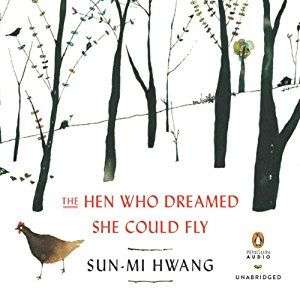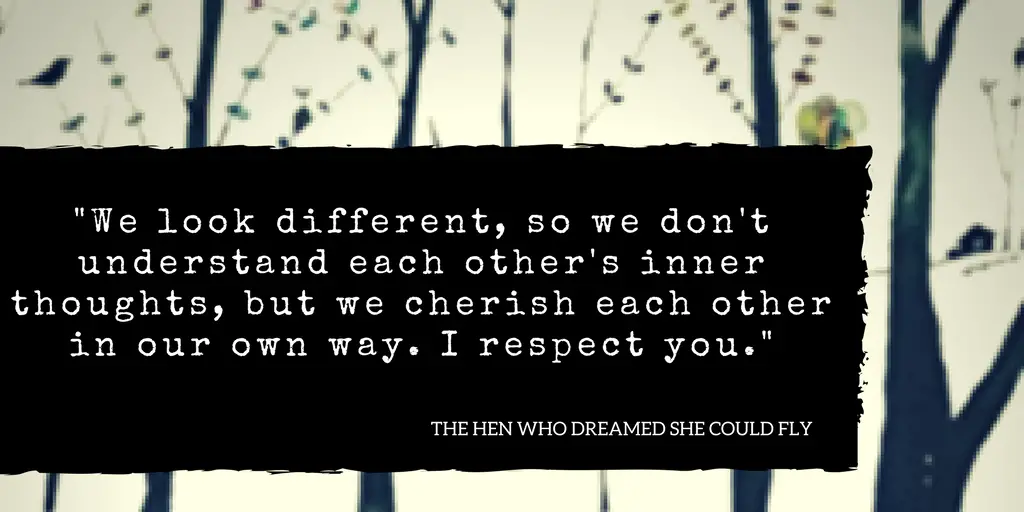THE HEN WHO DREAMED SHE COULD FLY by Sun-mi Hwang, Book Review
The 2 million-copy best-selling modern fable from Korea that won hearts around the world.

The Hen Who Dreamed She Could Fly Synopsis
This is the story of a hen named Sprout. No longer content to lay eggs on command only to have them carted off to the market, she glimpses her future every morning through the barn doors, where the other animals roam free, and comes up with a plan to escape into the wild – and to hatch an egg of her own.
An anthem for individuality and motherhood, The Hen Who Dreamed She Could Fly has captivated millions of fans in Korea, where it is a contemporary classic. Now the novel is making its way around the world, where it has the potential to inspire generations the way Jonathan Livingston Seagull or The Alchemist have. This first English-language edition beautifully captures the journey of an unforgettable character in world literature.
Written by: Sun-mi Hwang , Chi-Young Kim (translator)
Narrated by: Jill Larson
Length: 2 hrs and 58 mins, Unabridged Audiobook
Disclosure: If you click a link in this post we may earn a small commission to help offset our running costs.
Sign up to our Booklover Book Reviews emails and receive our gift for new subscribers. LEARN MORE >>
BOOK REVIEW
I believe there is so much to be gained from reading translated literature — an opportunity to experience different cultural nuances and paradigms. And fables that strike such a chord with a country’s readership to achieve bestselling status, such as Sun-mi Hwang’s The Hen Who Dreamed She Could Fly did in South Korea, provide great insight to that society.
On its publication in English, publishers’ blurbs labelled The Hen Who Dreamed She Could Fly a Korean Charlotte’s Web. While I personally do not think Hwang’s fable reaches the lofty heights of that much-loved childhood classic, common to both are their allegorical style and marginalised central characters.
Sprout was the best name in the world. A sprout grew into a leaf and embraced the wind and the sun before falling and rotting and turning into mulch for bringing fragrant flowers into bloom. Sprout wanted to do something with her life, just like the sprouts on the acacia tree. That was why she’d named herself after them. Nobody called her Sprout, and she knew her life wasn’t like a sprout’s, but still the name made her feel good.
Although initially naive, the scrawny and spirited Sprout is an endearing character that learns much on her life journey. Her loyalty and bravery under-fire are certainly morals worthy of celebration.
Some western readers have baulked at The Hen Who Dreamed She Could Fly‘s focus on value realisation through motherhood. And as someone who finds it infuriating that women appointed to positions of authority are still being asked why they have not had children, I too felt twinges of discontent in that respect. But I chose to focus on this story’s much more valuable and highly topical lessons about appreciating and respecting everyone’s value despite physical and cultural differences.

While I can’t knowledgeably comment on Chi-Young Kim’s (English translator) faithfulness to the original text, I note the narrative felt a little stilted (perhaps too literal) in places. This may however have been exacerbated by the sleepy, lullaby-ish quality of Jill Larson’s very sweet and clear, but relatively slow audiobook narration.
Sun-mi Hwang’s The Hen Who Dreamed She Could Fly is a moving and highly accessible contemporary utilisation of the barnyard allegory. If however you are seeking a memorable, layered and nuanced moralty tale, I would recommend the classics The Alchemist, The Little Prince and Lamberto, Lamberto, Lamberto or even the contemporary novellas The Flute Player, The Blue Fox and The Carpenter.
BOOK RATING: The Story 3.5 / 5 ; The Writing 3 / 5

Available from:
Audible | Book Depository | Amazon | Kobo | Bookworld | Scribd (Free 1 Month Trial)
Genre: Translation, Audio, Children, Drama, Literature
About the Author, Sun-mi Hwang
Hwang Sun-mi is a South Korean author and professor who is best known for her work The Hen Who Dreamed She Could Fly which was also made into a movie that broke Korean box office records for animated films, earning nearly 7 billion won in its first month of release.
Born in 1963, Hwang was unable to attend middle school due to poverty, but thanks to a teacher who gave her a key to a classroom, she could go to the school and read books whenever she wanted. She enrolled in high school by taking a certificate examination and she graduated from the creative writing departments at Seoul Institute of the Arts and Gwangju University, and from graduate school at Chung-Ang University. She lives in Seoul, South Korea and is an adjunct professor at the Faculty of Literature in the Seoul Institute of the Arts.
Hwang’s career as a writer began in 1995, and since then she has published nearly 30 books over various genres, including The Dog Who Dared to Dream also recently translated into English.
About the Translator, Chi-Young Kim
Kim Chi-young or Chi-Young Kim is a Korean-English literary translator who lives in the United States.
Originally having trained as a lawyer and translating as a hobby, Kim later became a professional literary translator. Her work includes the English translations of the award-winning novels Please Look After Mom by Shin Kyung-sook and The Hen Who Dreamed She Could Fly by Hwang Sun-mi.
Other reviews of The Hen Who Dreamed She Could Fly
Goodreads, Publishers Weekly, The Guardian, Bookslut, Kirkus Reviews
